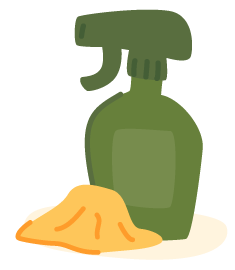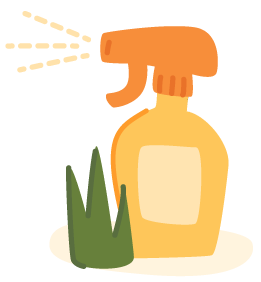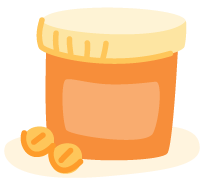How to make your home truly pet-friendly


With a move towards a more natural home environment and more brands offering chemical free products for humans, it’s no wonder people are looking for ways to create a safe low tox environment for pets too. So, to help you make your home truly pet-friendly for your pawsome buddy, we have put together a few things you need to consider: pet friendly cleaning products, pet friendly fragrances, pet friendly plants among other considerations.

Fragrances
With many Aussie pet owners bringing their pets inside, we sometimes find ourselves using perfumed products to combat the ‘dog smell’. These shampoos, candles, oils, diffusers, and even our perfume can irritate our pet’s skin if they contain toxic or harsh chemicals; look for natural, pet-friendly frangrances and products, or create your own room spray with pet-friendly essential oils (lavender is a popular choice).

Cleaning
Cleaning is a part of life, it can’t be avoided, and with pets in and around the house there will be even more cleaning to be done (yes, we know). We recommend that you consider using natural cleaning and laundry products as these will be less irritating for your pooch, and remember that some essential oils are harmful for dogs, even common household oils like pine, citrus, tea tree, sweet birch, and peppermint, just to name a few, so make sure these are out of reach for pets and not used on floors where they walk and absorb these toxins into their paws. Many people use dettol for cleaning - this product is toxic to dogs.
Also, another important reason to keep on top of the cleaning is that dust mites are major culprits for red, itchy skin and even hair loss for our pets. Pet parents of extra sensitive dogs will pop their dog in another room or outside to vacuum as vacuuming can stir up the allergens.

Plants
Including plants inside your home is a great way to purify the air, but make sure they’re plants that are safe for pets.
We’ve got a list of common plants that are safe and unsafe for your 4 legged babies and also plants that should be avoided. Most of the time, plants are fine in the home if your pets don’t chew or ingest them.

Outside the house
Just like internal household products, our backyards may have chemicals and toxins that can also affect our pets. Lawn sprays with harsh chemicals, and many common backyard plants can cause harm to your dog. There are lots of pet-friendly lawn and garden sprays available, these may not necessarily be chemical free, so make sure you double check as there are more options for natural sprays available now.

Medication
If your dog has recently been prescribed antibiotics, not only can this put pressure on their immune system but some dogs may experience side effects from antibiotics (eg. skin irritations), there’s also the chance your dog could develop a yeast infection after a course of antibiotics. A probiotic will help restore and recover your dog’s digestive and immune system after sickness and antibiotic use.
As Dr Edward Bassingthwaighte says “I would never treat my pets for fleas unless I see fleas. You can also treat your yard with flea nematodes, which is completely non-toxic.”
Be sure you have a reason to use preventative medicines, for example, if you live in or are travelling into an area that is known for paralysis ticks, then it absolutely makes sense to use a preventative medicine.

Food
We know that good health starts in the gut, so a high-quality diet is important to support our dogs’ immune systems, whereas a highly processed diet loaded with preservatives can put pressure on a dog’s immune system. A fresh, raw food diet is the most natural option for your pet, we recommend that you look for brands that only use natural, human-grade ingredients and follow a BARF style .
We recommend the same approach with treats, stick to products that are natural and minimally processed. Freeze-dried treats are a great option being the next best thing to raw, you have the convenience of a dry, shelf stable product that you can use on the go.
How can I support my pet’s immune system?
The health of a pet’s digestive system has a remarkable influence over the health of the rest of the body. It is an integral part of the immune system, forming a physical barrier to invading pathogens as well as acting as a source of information for immune cells to respond to as needed. Supporting your pet’s immune system to function optimally will help avoid symptoms like itchiness.
For dogs that are experiencing irritated or sensitive skin it’s important to ensure their diet is loaded with anti-inflammatory ingredients. Look for ingredients like salmon, pressed coconut oil, turmeric and activated chia seeds to promote a healthy skin, soft and shiny coat and a stronger immune system to minimise the possibility of future skin issues.
To offer your pet further support, including a probiotic in your dog’s diet, will help to keep immune system healthy and ready to respond to pathogens, as well as assisting immune system regulation and some immune related skin conditions. It’s important to choose a probiotic that is therapeutic strength with good bacterial levels in the billions and is a species appropriate probiotic formulated specifically for dogs.
Nature always gets it right
With the foundation of a good diet and avoiding chemicals in their daily environment, you’ve already made huge steps toward a more natural lifestyle for your furry family member. You can take this further and look at your dog from nose to toes with a whole dog approach to caring for them and giving your dog the best shot at thriving and living their best life with you.
